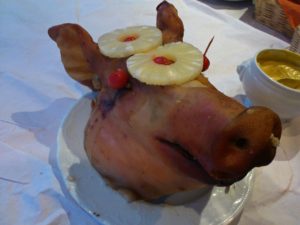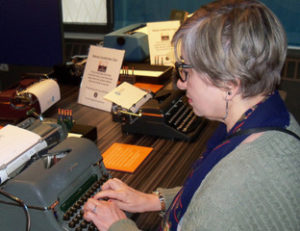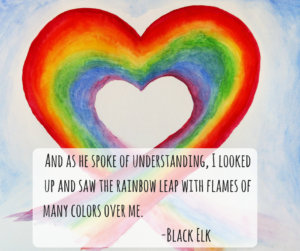 Look, I love to write about terrible food. Life contains so much more of it than good food, or at least my life does. (I have limited funds and poor judgement for risk.) But more than the realism, I’m drawn to bad food because it infuses a scene with context, with a messy pathos. Someone failed before this dish was even served.
Look, I love to write about terrible food. Life contains so much more of it than good food, or at least my life does. (I have limited funds and poor judgement for risk.) But more than the realism, I’m drawn to bad food because it infuses a scene with context, with a messy pathos. Someone failed before this dish was even served.
I think about the scene in Tinker, Tailor, Soldier, Spy in which the spymaster George Smiley tells the story of his one meeting with his Soviet opposite number, Karla. Sitting in a greasy restaurant with his confidant, he takes a few bites of his chicken, murmuring, “There, that shouldn’t offend the cook.” By the end of the scene, he’s given up on the dish, “over which white flakes of fat had formed like seasonable frost.” I mean, the frost isn’t even unseasonable. It is correct that this is happening; it is meet. That chicken died for nothing and everyone knows it.
The cook may have made an unpalatable dish for a sad, unhungry man, but Le Carré prepares a nose-to-tail butcher’s feast of pathos and waste. One of the points of the scene is that Smiley tried and failed to pull a Not So Different Speech on Karla; he ruined it because he’s honest, and honestly lonely. The chicken fulfills its destiny in a way that’s perfect for the mood. It doesn’t symbolize Smiley’s feelings ““ nothing so cheap. Le Carré is a subtler chef than that. Each grim bite of Smiley’s chicken evokes a universe where no spymaster, no heroic fieldman, no great analyst, no chicken farmer or chicken or roadhouse chef, can catch a single break.
I come from a Patrick O’Brian family, and when I mentioned this post to my brother Aaron, he ran to find the bit in The Far Side of the World where Captain Jack Aubrey serves up a lobscouse on which “the liquid fat [stands] half an inch deep over the whole surface.” Later, a pie leaks “thin blood [thin blood!].” As Aaron points out, the pie is rich with social worldbuilding: “Jack has no cook and he’s had to rely on various sailors who don’t actually know how to provide dishes. He’s high class enough that he can’t cook, but he exists in a social setting where he can make one set of people cook for him and another pretend to enjoy the terrible results. […] I feel like a lot of bad meals in literature say stuff about power. One thinks also of the meals Charles’ dad attacks him with in Brideshead Revisited. First red dishes, then white dishes!”
I am myself, as I have said, a gleeful writer of tragic food. It’s true that my debut, The Breath of the Sun, doesn’t have the worst food I’ve ever written. This is because I cut a scene in which a character orders something called “chicken cogulare,” which beats out a scene from a previous manuscript in which a Potemkin village of breakfast pastries is served by an evil prince.
It’s also because The Breath of the Sun is a mountaineering novel, and the literature of survival has a very specific relationship with bad food: since these stories are about scarcity, they’re also about the miracle of having food at all. I remember a meal of spaghetti and fried garlic bread in Kim Stanley Robinson’s underrated Antarctica, which prompts a character to contemplate that Antarctic food, eaten in “extreme states of hunger,” “often tasted wildly delicious even if it was very plain fare.” By the same token, who could forget the “feast of hot water” with which Genly and Estraven celebrate their ice trek in The Left Hand of Darkness (or the hot beer, oddly pleasant in an ice age, over which they make the first moves of their complicated friendship)? Some of the food on Gethen is very fine, and some of it is bad, but it is always transmuted by the sharing at the hearth.
In The Breath of the Sun, when my characters eat dried chicken and biscuit (singular, because in Arctic narratives “biscuit” is a monolithic item), and when my narrator Lamat observes that this biscuit needs to be heavily hydrated with saliva before it can be swallowed, I want to evoke a purely practical un-food. Dehydrated and preserved, it doesn’t feel prepared by human hands. For my two cranky and embittered heroines, the solitude of climbing is both terrible and delicious, and so is the dried pap you eat from a tube. To climb is to leave the context of the earth, and I use food to stretch out that feeling as far as it will go.
Even a breakfast the characters eat when not on the mountain, served by Lamat’s velvety and brutal ex-husband, has this feeling of detachment. Served on “a dirty white table” in an empty courtyard, it is “an untidy heap of miscellaneous food “” rolls and dates and apples with an unpleasant touch of lemon-juice to them, boiled eggs.” The same preservation, the same detachment, but this time there’s nothing delicious or terrible about it, only a mess of context on a plate.
Lamat’s a bartender and innkeeper when not climbing, and I think the only food she really trusts anymore is what she makes herself. When she imagines the mountain from the city, she can only conjure “a morning like a clear glass cup of tea and an egg.” And when she comes home to her lover, she describes her as “a burning breath of coffee, a sense of solidity and strength […] a steady fierce look like some tame animals have.” Home is the right drink on the right breath, and privacy.
Good food is a joy of literature, of course, just as in life. But for subtle worldbuilding, for comedy, for the interplay of hospitality and power — give me the bad stuff. It is a dish of vertiginous depth. Plus, I don’t have to taste it.
 Bio: Rachel Fellman is an archivist in Northern California. She writes sharp, painterly science fiction and fantasy about her various preoccupations: art history, extreme survival, toxic love, queer identity, and terrible moral choices. Most of her protagonists are great at exactly one thing and are continually prevented from doing it. Publishers Weekly called her debut novel, The Breath of the Sun, “an atmospheric, poetic, and occasionally wry and brutal story that moves with the gentle but unstoppable momentum of an iceberg.” She does not climb mountains.
Bio: Rachel Fellman is an archivist in Northern California. She writes sharp, painterly science fiction and fantasy about her various preoccupations: art history, extreme survival, toxic love, queer identity, and terrible moral choices. Most of her protagonists are great at exactly one thing and are continually prevented from doing it. Publishers Weekly called her debut novel, The Breath of the Sun, “an atmospheric, poetic, and occasionally wry and brutal story that moves with the gentle but unstoppable momentum of an iceberg.” She does not climb mountains.
Enjoy this writing advice and want more content like it? Check out the classes Cat gives via the Rambo Academy for Wayward Writers, which offers both on-demand and live online writing classes for fantasy and science fiction writers from Cat and other authors, including Ann Leckie, Seanan McGuire, Fran Wilde and other talents! All classes include three free slots.
If you’re an author or other fantasy and science fiction creative, and want to do a guest blog post, please check out the guest blog post guidelines.








 Treading the waters of diversity is tricky because we never want to disrespect the struggles that women, people of color, the LGBTQ community, or others have had to endure. As writers, we often want to include people like this in our stories because their stories are powerful and can make a difference. This sometimes manifests itself as ‘the gay friend’ or ‘the black friend’ or if you’re really batting for a home run ‘the gay black friend’. This character is great for diversity. He shows that those people exist and that we shouldn’t be afraid of them. But over time, if we see the gay black friend over and over it creates a subliminal message that all gay black men behave a certain way, and that can damage the community. I think we should allow those characters to break the mold and keep it to themselves.
Treading the waters of diversity is tricky because we never want to disrespect the struggles that women, people of color, the LGBTQ community, or others have had to endure. As writers, we often want to include people like this in our stories because their stories are powerful and can make a difference. This sometimes manifests itself as ‘the gay friend’ or ‘the black friend’ or if you’re really batting for a home run ‘the gay black friend’. This character is great for diversity. He shows that those people exist and that we shouldn’t be afraid of them. But over time, if we see the gay black friend over and over it creates a subliminal message that all gay black men behave a certain way, and that can damage the community. I think we should allow those characters to break the mold and keep it to themselves.




2 Responses
I loved the bad food in Karin Tidbeck’s Amatka, a visceral dystopia. Our protagonist gnaws on raw cubes of rutabaga and starts her day with mushroom porridge “” in a world of cold scarcity.
I really enjoyed the descriptions of food in “Antarctica” too, to the point that I’ve always pictured those meals as being really tasty, regardless of the monotony of the food. But it’s one of my favourite books. I’m currently on my fourth copy as people keep “forgetting” to give it back to me. That scene in the pool under the ice makes me so jealous that I can’t be there!
Now I’m going to go and explore The Breath of the Sun, because I love mountaineering stories (even though I don’t climb either!)